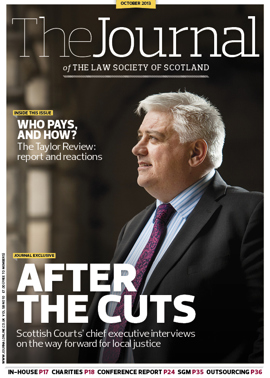The truth, the whole truth...

The police have a vital role to play in the world of licensing at all levels. Were it not for the product which is licensed, their job would be a much easier one.
Were it not for the ineptitude of our politicians, their role in the licensing process would be much clearer. No one, other than the mother of the parliamentary draftsman, could fathom why the first version of the 2005 Act gave police powers to object only on the grounds of involvement in “serious organised crime”. Serious, but disorganised crime was all right then.
That was amended, and further changes are likely in the next round of licensing reform, expected next year. The police have been pressing for some time for a return of the old “fit and proper person” test. Trying to analyse that test, and give definitive advice on what it meant, was not the easiest of tasks. It was, however, a test we had been used to for many years, and there was some case law on the point, though less than one might have expected.
Intelligence test
At least the police had to present some facts to justify an objection on this ground. Those of us who practise before boards have observed a disturbing trend, with unspecified “police intelligence” being cited as additional “grounds” to support a premises licence review. This meaningless nonsense became quite common in reviews featuring a single test purchase failure. As the courts became more robust in saying that a single test purchase failure did not justify finding grounds for review established, this unspecified spectral reason was often brought in as some sort of second ground.
Thankfully most responsible licensing boards gave this short shrift, and it was to be hoped that it was the work of less senior police. It was therefore a great shock to hear this approach being commended by Stephen House, Chief Constable of Police Scotland, in a recent speech. His suggestion was that an information commissioner should be privy to the nature of the intelligence and should then report to the board on whether they thought the intelligence was satisfactory. The person whose livelihood was at risk would still not be made aware of the information being relied on. As far as I am aware, neither would the individual boards.
Jack Cummins has described this as having the potential for justice on a par with witch trials. It has also been denounced by Malcolm Cunning, convener of Glasgow Licensing Board.
Taking liberties
It may also explain a new “investigation” procedure creeping outwards from Sir Stephen House’s old fiefdom, Strathclyde. Applicants for transfer are being asked for copies of missives or leases. It was reasonable enough to ask for these under the 1976 Act, in terms of which a licence was to be granted to a person for the sale or supply of alcoholic liquor by that person. That is no longer the case.
As recorded or registered deeds are in the public domain, many people had no great issue with providing this, even post-1 September 2009. In more recent times, however, these requests were accompanied by demands to see bank statements, evidence of other assets and other personal information to which the police have no right. The applicant is not told that there is no obligation to produce these, and I am aware of at least one case where an objection was lodged to a transfer application because this information was not supplied. That is quite simply an abuse of power.
In the administrative side of licensing, all parties have to work together, and it is not unreasonable to expect a bit of give and take all round. This goes far beyond that. Anyone who has clients subjected to this should be complaining loudly. If Sir Stephen and the new Police Scotland are to be taken seriously, such clear breaches of civil liberties must cease, or the fit and proper test will be applied elsewhere.
In this issue
- Jewel in the crown, or just red tape?
- In the public interest
- Sweeney: room for manoeuvre
- Lost in translation?
- EU Fundamental Rights Agency: the missing link?
- Reading for pleasure
- Opinion column: Stephen Gold
- Book reviews
- Profile
- President's column
- FM officially opens new MBH
- Feeling the squeeze
- Litigation: a numbers game
- Mythbusting! The in-house IT top ten
- Charities and the changing legal landscape
- Heir finding: the sensitive side
- Sign up to boost charity giving
- Law, but not as we know it
- All the permutations
- The truth, the whole truth...
- Shale gas: a complex process
- Expenses up to date?
- Scottish Solicitors' Discipline Tribunal
- Room at the top?
- Here comes the flood?
- SGM decision kills "sep rep"
- Outsourcing: the straight and narrow
- How not to win business: a guide for professionals
- Properly engaged?
- Ask Ash
- Sep rep: what now?
- From the Brussels office
- Law reform roundup






